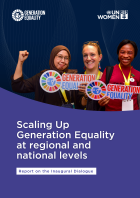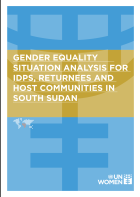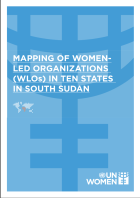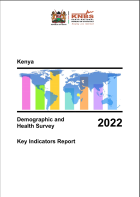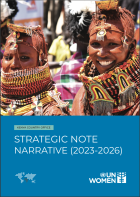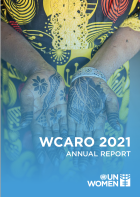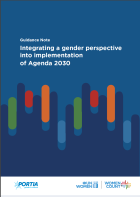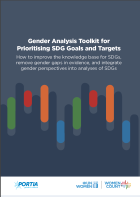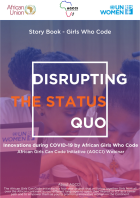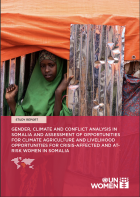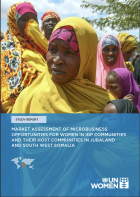1 - 20 of 22 Results
Pagination
Date:
This report summarizes the discussions, outcomes, and recommendations from the Generation Equality Dialogues “Advancing Generation Equality Through Local Action: Scaling up Generation Equality at national and regional levels” held on September 12, 2024.
Date:
Generation Equality is a global initiative that aims to drive change through a multigenerational and multi-stakeholder approach, focusing on key issues like equal pay, fair distribution of unpaid care work, eradicating gender-based violence, healthcare access, and increasing women’s political participation.
Date:
This background paper aims to inform policy and processes that place African women and girls at the centre of change in tech and innovation and the inevitable transformation to Africa’s development.
Date:
This Policy Brief will explore the results of the mapping of the women’s movement, and the weaknesses, strengths and recommendations of the current civil-society movement as identified during the National Forum and analysis of the mapping.
Date:
As gaps remain in efforts to stem the tide of global economic crises, having fiscal policies in place to safeguard spending for women is essential. Gender Responsive Budgeting (GRB) can ensure a gender-equitable allocation of resources and expenditure tracking to promote gender equality. This briefing note provides information on the foundation established to determine entry points for this work, key partnerships, and plans to advance systemic financing for gender equality in the country.
Date:
As gaps remain in efforts to stem the tide of global economic crises, having fiscal policies in place to safeguard spending for women is essential. Gender Responsive Budgeting (GRB) can ensure a gender-equitable allocation of resources and expenditure tracking to promote gender equality. This briefing note provides information on the foundation established to determine entry points for this work, key partnerships, and plans to advance systemic financing for gender equality in the country.
Date:
The Kenya Demographic and Health Survey (DHS) provides accurate and representative data on population, health, HIV, and nutrition. The data was collected in 2022 and the report published in 2023.
Date:
UN Women Kenya will focus on integrated approaches with seven systemic outcomes to address the root causes of inequality and affect broader systems change, across its thematic focus areas:
• Governance and participation in public life
• Women’s economic empowerment
• Ending violence against women and girls; and
• Women, peace and security, humanitarian action, and disaster risk reduction
Date:
As gaps remain in efforts to stem the tide of global economic crises, having fiscal policies in place to safeguard spending for women is essential. Gender Responsive Budgeting (GRB) can ensure a gender-equitable allocation of resources and expenditure tracking to promote gender equality. This briefing note provides information on the foundation established to determine entry points for this work, key partnerships, and plans to advance systemic financing for gender equality in the country.
Date:
Drawing on an assessment of the needs of rural women in Senegal, Mali, Liberia, Malawi and Haiti, and on an ecosystem mapping and market dialogue process, these infographics illustrate the challenges that rural women face to access resilience-building services that are tailored to their needs, and provide insights into gender-responsive policy measures and innovative solutions to respond to the women’s needs and build their resilience to climate change and disasters.
Date:
Gender responsive approaches in Climate Smart Agriculture.
Date:
This quarterly newsletter profiles UN Women Uganda activities and highlights voices of beneficiaries. The Q3 Newsletter covers the period of July to September 2022.
Enjoy the read!
Date:
2021 marked the end of the latest UN Women Strategic Plan, and during the year UN Women’s West and Central Africa Regional Office (WCARO) and Country Offices/Non-Resident Agencies continued to strengthen a comprehensive set of global norms, policies, and standards on gender equality and the empowerment of women; help end all forms of violence against women and girls; foster women’s economic empowerment; encourage and support women to lead; facilitate gender mainstreaming; and support women’s participation in peacebuilding and resilience efforts. Throughout the year, the COVID-19 pandemic continued to impact West and Central Africa, and women in the region were particularly vulnerable to the crisis.
Date:
This study explains why it is important to integrate a gender perspective into assessments of all the SDGs, and also shows how to approach this task as a way to enhance gender mainstreaming across the 2030 Agenda.
Date:
Consistent integration of a gender perspective into each SDG requires that the methodological approaches used to analyse targets should be capable of identifying gender inequality concerns in the ‘gender silent’ targets and when mapping interlinkages between them. Ths toolkit adresses sustinability issues by providing SDG researchers, analysts, and policy experts with the necessary tools to incorporate gender considerations throughout their Agenda 2030 related work.
Date:
Innovations during COVID-19 by African Girls Who Code
Date:
This quarterly newsletter profiles UN Women Uganda activities and highlights voices of beneficiaries. The Q2 Newsletter covers the period of April to June 2022.
Enjoy the read!
Date:
Despite the gender, climatic and conflict situation in Somalia, there are opportunities to ensure crop farming and livestock rearing. Women’s participation in agricultural activities also varies depending on where they live. Women living in their regular settings were more likely to participate in agriculture compared to their counterparts who live in IDP settings. The research is aimed at promoting women's resilience to climate and enhancing livelihoods.
Date:
Empowering women in the economy and closing gender gaps in the workspace is key to achieving the 2030 Agenda for Sustainable Development and achieving the Sustainable Development Goals in Somalia. The host community landowners and IDP casual laborers can jointly build their skills in climate-smart agriculture that can benefit the productivity of farms whilst also building the knowledge and skill set of IDPs.
Date:
This report highlights UN Women Nigeria’s work for the year 2020. The report builds around the Nigeria Country Office programmatic areas of intervention and reflects the achievements attained in collaboration with various government and non-governmental partners who contributed to policy advocacy efforts, delivery of services, implementation, and funding of interventions aimed at promoting gender equality and women’s empowerment. The population at large (men, women, boys...

